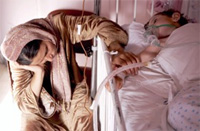 Shortages in life-saving medicines are having a devastating impact on the lives of ordinary Syrians24 January 2013 – 22 months of conflict in the Syrian Arab Republic have resulted in substantial damage to the national health system. 55% of public hospitals and 10% of public health centres have been damaged or destroyed, and functioning hospitals are often overwhelmed with patients. Pharmaceutical plants that previously produced 90% of the country’s medicines and medical supplies are no longer functioning resulting in critical shortages in medical supplies and medicines, especially for chronic diseases.
Shortages in life-saving medicines are having a devastating impact on the lives of ordinary Syrians24 January 2013 – 22 months of conflict in the Syrian Arab Republic have resulted in substantial damage to the national health system. 55% of public hospitals and 10% of public health centres have been damaged or destroyed, and functioning hospitals are often overwhelmed with patients. Pharmaceutical plants that previously produced 90% of the country’s medicines and medical supplies are no longer functioning resulting in critical shortages in medical supplies and medicines, especially for chronic diseases.
Destruction and damage of key infrastructure, including medical facilities, clinics and hospitals, has a tragic impact on the life of ordinary people. Patients with chronic diseases are unable to make regular visits to hospitals to seek treatment. Limited access to health facilities due to the security situation, relocation to less volatile areas and shortages in essential medicines now makes it a challenge for these patients to continue their life-saving treatment.
In al-Raqqa governorate, which hosts 500 000 internally-displaced persons (IDPs), the caseload of diabetic patients has increased from 10 000 patients to 21 000, and no additional supplies of diabetic medication are being provided. At al-Thanaa haemodialysis centre in Damascus, the number of free haemodialysis sessions had to be decreased from three per week to two per week due to a shortage in machines, medical equipment and supplies.
Six-year-old Joseph was diagnosed with leukaemia in early 2012. Nine months ago, he and his family fled their hometown in Daraa and are currently living with his uncle near Damascus. Due to shortages in medicines for cancer patients, Joseph has been unable to continue his treatment. “I do not want my child to die”, said Joseph’s father. “We have not been able to secure his medicine for three months now”, he added. “I want him to live for a long time, he is only six … but he is strong and a true fighter”.
Five-year-old Abdo was diagnosed with neuroblastoma in March 2011 after complaining of pain in his side and an oncologist discovering a malignant tumour close to his kidney and aorta. Doctors advised Abdo’s parents that surgery would pose a significant risk to his life due to the position of the tumour. Out of the four courses of chemotherapy required, Abdo has so far only been able to receive two courses. The Ministry of Health used to secure the medication for Abdo almost for free, but the economic sanctions, currency fluctuations and the damages to numerous hospitals and medical centres is reflecting in severe shortages in medicines and pharmaceutical products. Today, Abdo’s chances of accessing his treatment in due course are decreasing. Abdo was forced to relocate from his home in Aleppo last July. “We have not been able to complete the treatment due to the shortage in cancer medicines”, said Abdo’s mother.
Unaware of the risks, Abdo plays with his new cat. “Those doctors know nothing”, he said. “I am much better when I am not taking the medicine. Every time I take it I get sick. I keep vomiting and my mother cries.”
For more information, contact Elizabeth Hoff at


